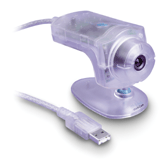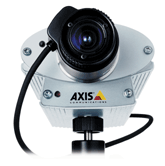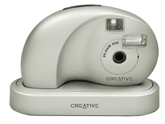Webcams, which let you capture digital video and immediately transmit it over the Internet, have become a popular mainstay of reality TV shows and tech-savvy consumers.But government agencies also are discovering serious uses for webcams, especially since Sept. 11, when surveillance and information sharing among agencies became a top priority.Webcams appeal to IT managers because they adhere to IP, the lingua franca of public networks and, increasingly, private ones. Unlike the analog cameras used in closed-circuit television, which typically store images on cumbersome videotapes, webcams are digital from the get-go, producing images that can easily be edited, catalogued, analyzed, transmitted and stored in databases.Many professional cameras are Ethernet-ready, so they integrate nicely with LANs, opening up new possibilities for distributing imaging technology throughout an organization.There are webcams, and there are webcams.The 'eyeball' cameras popularized by market leader Logitech Inc., its rival Creative Labs Inc. and other companies long ago became cheap commodities. Despite a lull last year, the tiny devices should continue to grow in popularity, with U.S. sales rising from 6 million units in 2002 to 9.4 million by 2006, predicted market researcher International Data Corp. of Framingham, Mass.The devices rarely cost more than $80 and are best for personal uses, such as desktop videoconferencing or e-mailing short video clips, though the latter could appeal to agencies for sharing information that includes motion, such as demonstrating machines and other processes.PC webcams' image quality is often disappointing, though it's gradually improving. TV-quality, 30 frame-per-second video has a harsh tradeoff with image sharpness. Although this also is true of high-end cameras, they have superior sensors that produce better images, according to experts.Another disadvantage: PC webcams are closely tethered to the PC, so you can't position them very far from the box.Outside homes, PC webcams haven't taken off as videoconferencing tools, in part, some observers say, because organizations don't want employees tinkering with hardware, wasting time or compromising security.A variation might be about to challenge IT managers further: video instant messaging, the emerging webcam killer app, according to vendors. It lets you add video to live IM text sessions. But with IM already becoming a problem at many organizations, adding video will further strain already overtaxed bandwidth.A recent innovation is cameras designed to clip on to notebook PCs. Makers of consumer webcams also sell hybrids, often called dualcams, which contain a still digital camera that can be detached from its desktop holder and carried around. In this mode, the cameras run off standard batteries rather than the power from the PC's USB port.But don't expect much quality. 'It's not a real good camera,' said Michelle Slaughter, research analyst at InfoTrends Research Group Inc. in Boston.IP network cameras from companies such as Axis Communications Inc. and Sony Electronics Inc. are the real sweet spot for serious uses. They have higher-quality, faster image sensors than PC webcams, so they're capable of hosting mission-critical security applications, from recognizing faces to monitoring border crossings.Monitoring construction sites is another popular use. The better models have the ability to pan, tilt or zoom to focus on subjects, and most have motion-detection sensors that can snap pictures of intruders and issue e-mail alerts. Low-end models cost about $300, which is not much more than the priciest consumer webcams.Network cameras don't just stand alone from PCs, they basically are PCs, typically running Linux and Web server software. As intelligent network devices, they can be viewed and controlled from popular browsers and placed wherever Category 5 Ethernet cabling will take them. Some newer models even link wirelessly.Vendors of PC and network webcams concede that camera technology isn't advancing very quickly, though electronics manufacturers continually improve the speed, resolution and colors of complementary metal-oxide semiconductor image sensors and their higher-quality competitors, charge-coupled devices. The emerging MPEG-4 file standard promises improvements in speed, compression and image quality, and several vendors say they're actively investigating it. But it has been slow to catch on, in part, some say, because of licensing costs.The biggest recent advances, in fact, have come in the peripheral ports used to connect the devices. A few cameras have added the new Universal Serial Bus'USB 2.0'as standard, which promises faster streaming video and higher-resolution images than USB 1.1. A few cameras come with a competing high-speed standard, IEEE 1394, commonly known as FireWire.There are other ways to get video on the Web, but they are generally more expensive and cumbersome, and less flexible, than IP devices.PC video capture cards, for example, digitize analog camera signals, which can then be massaged for the Web. But if they are run inside PCs, they suffer the reliability problems of the PC platform, which tend to be absent in the self-contained network cameras.Video capture cards might work for agencies that have made large and fairly recent investments in analog security or closed-circuit cameras. Another option, surveillance-style digital video cameras, often lacks convenient IP connectivity. Still another type, digital camcorders, might not be suitable for the fixed mounts preferred for security and monitoring. Even some still digicams can capture short videos, but they lack the immediacy of a true webcam.The choices boil down to IP network cameras or, if your needs run toward single-user videoconferencing and video e-mail, a PC webcam. The accompanying chart shows both consumer-class and network cameras. It doesn't include devices marketed primarily as still cameras, or high-end digital cameras that lack built-in, bundled or optional Web support.With prices rarely exceeding $1,500 even for an automated network camera, the investment, like many of the technologies enabled by the Web, is easy to swallow.Experts recommend, though, that you have a clear idea beforehand of the camera's location and connections, make sure it has the right lenses for capturing the scene and beware of misleading resolution claims. Impressive resolution numbers often are achieved by interpolation, a digitizing process that gives an illusion of sharpness.Aside from scanning spec sheets, the best way to find out is to see a live demo or have a camera's images e-mailed to you. Seeing is believing.
The Axis 2120 is an indoor network camera that can be adapted for outdoor use. It's priced at $949
Creative Labs' $150 PC-CAM 600 is a digital and desktop camera powered by batteries or via a USB connection. Below: D-Link Systems' DSB-C100 desktop PC camera, priced at $29, connects via USB.
 Video instant messagingOther video optionsDavid Essex is a free-lance technology writer based in Antrim, N.H.
Video instant messagingOther video optionsDavid Essex is a free-lance technology writer based in Antrim, N.H.









